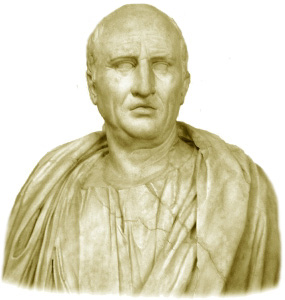...Best of Sicily presents... Best of Sicily Magazine. ... Dedicated to Sicilian art, culture, history, people, places and all things Sicilian. |
by Vincenzo Salerno | |||
Magazine Index Best of Sicily Arts & Culture Fashion Food & Wine History & Society About Us Travel Faqs Contact Map of Sicily
|
Throughout Rome's civil wars and Julius Caesar's de facto dictatorship, Cicero advocated for the re-establishment of republican government. In the wake of Caesar's murder, Cicero was targeted by Mark Antony, whose policies he criticized. Declared an enemy of Rome, the orator was assassinated in 43 BC. Following a few years in the military, Cicero's successful legal career began around 80 BC with the defense of accused murderers, but the following year he visited Greece. In those times, to be considered "cultivated" meant to speak Greek fluently. In Athens Cicero honed his oratory skills and deepened his knowledge of philosophy. Returning to Rome, he became a quaestor, and in 75 BC was appointed to a post in western Sicily, where he garnered fame for his fairness and honesty. This is where his most famous case, against the island's Roman governor, began. Prosperous Sicily was the first province of Rome (peninsular Italy being the "Roman" province). The majority of its inhabitants still spoke Greek, though many were bilingual in Greek and Latin and there was a large Italic population on the island, particularly administrators from central Italy. One such administrator was Verres. As governor of Sicily, Gaius Verres (120-43 BC) had a history of accepting bribes. Sicily had been one of the richest provinces of the Empire, a productive agricultural region and an important crossroads of Mediterranean trade. Verres' administration changed this, leading to more poverty than the island had known during the destructive Punic and Servile wars. How corrupt was Verres? The governor assigned lucrative public contracts to his friends and pilfered public funds generated through punitive taxes. He sacked prosperous towns like Morgantina, once famous for its important mint and Greek silver crafts. Verres even stripped the principal temple of Syracuse (now Siracusa Cathedral) of its gold and ivory ornamentation! While others in Sicily were reduced to poverty, Verres lived in lavish luxury in a rural villa not unlike the one outside Piazza Armerina. (Had he been born some two millennia later, greedy Verres would be in his element in the corrupt Sicilian political environment of our own times.) For his defense, Verres hired the flamboyant, grandstanding Quintus Hortensius Hortalus, reputed to be Rome's greatest lawyer, and tried in vain to delay the trial until he might have friendlier senators as his judges. Nevertheless, the hearings began in 69 BC. Cicero only needed a few minutes to make his point. The dramatic series of legal hearings showcased substance over style, in the process establishing Cicero as the greatest orator in the ever-expanding Roman world. At one point, Cicero famously stated: "...with you on this bench, gentlemen, with Marcus Acilius Glabrio as your president, I do not understand what Verres can hope to achieve." So persuasive was Cicero's first brief opening speech that Hortensius declined rebuttal and immediately advised his client to flee the Roman province. Verres, who was eventually found guilty, passed the rest of his life in comfortable exile in Massilia (now Marseille). Of the seven Verrine Orations, only two were actually delivered orally. Cicero's speeches may seem arcane, but an oratory on ethics, implicitly directed at Rome's ineffective government, The Extremes of Good and Evil (given in 45 BC), provided the "dummy text" used by typesetters since the sixteenth century to fill space where a publication's complete (final) text has yet to be composed: Lorem ipsum dolor sit amet... Sicily was the better following the removal of Verres, and Cicero went on to a glorious career, as aedile in 69 BC at age 37, praetor in 66, and then consul in 63. He continued to prosecute corrupt officials, effectively cleaning up Rome's political mess. In 60, fearing its threat to the republic, Cicero declined Julius Caesar's offer for appointment to what became the First Triumvirate. Two years later, Cicero was forced into exile as a result of legalistic machinations against him. He returned to Italy and his family following a year in Greece. It was not to be his first exile to places across the Adriatic. Cicero's principles eventually led to his death. Yet his place as Rome's greatest jurist and orator is an assured one, and so is his place in Sicilian history. About the Author: Palermo native Vincenzo Salerno has written biographies of several famous Sicilians, including Frederick II and Giuseppe di Lampedusa. | ||
Top of Page |
 The orator, jurist,
politician and philosopher Marcus Tullius Cicero was born into a
prosperous family of the equestrian class south of Rome in 106 BC (BCE).
His surname, deriving from the Latin cicer, indicates that his remote
ancestors cultivated
The orator, jurist,
politician and philosopher Marcus Tullius Cicero was born into a
prosperous family of the equestrian class south of Rome in 106 BC (BCE).
His surname, deriving from the Latin cicer, indicates that his remote
ancestors cultivated